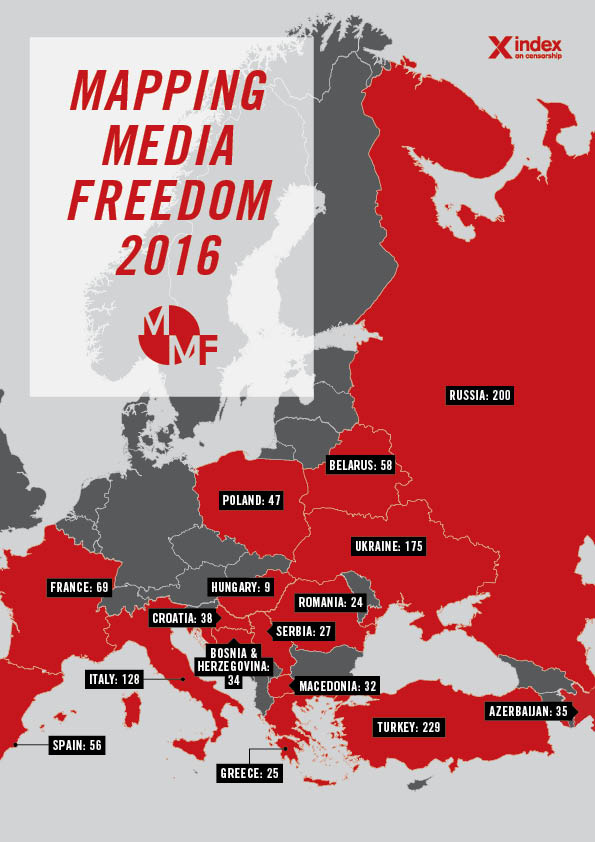Press Freedom Faces ‘Unprecedented’ Threat in 2017 (Rights Info)
Journalists face an escalating risk of violence, threats and government censorship ‘like never before’, according to a report from Index on Censorship. Read the full article
Journalists face an escalating risk of violence, threats and government censorship ‘like never before’, according to a report from Index on Censorship. Read the full article
 Freedom of expression campaign group Index on Censorship launches Media Freedom Month in March with the release of its annual report into media freedom in Europe. The report shows journalists face regular harassment, legal sanctions and even jail for doing their job – even in supposed democracies. Index’s Media Freedom Month aims to raise awareness of and funding for its work campaigning on press freedom.
Freedom of expression campaign group Index on Censorship launches Media Freedom Month in March with the release of its annual report into media freedom in Europe. The report shows journalists face regular harassment, legal sanctions and even jail for doing their job – even in supposed democracies. Index’s Media Freedom Month aims to raise awareness of and funding for its work campaigning on press freedom.
“Right now, journalists and journalism are threatened from all directions: UK journalists who travel to the US are being told they need to hand over their mobile phone contacts and Facebook passwords. US journalists are being labelled as peddlers of ‘fake news’ over any articles the President dislikes and reporters across Europe face a host of laws that hamper their ability to work,” said Index chief executive Jodie Ginsberg.
Media Freedom Month will begin with the launch on Tuesday of the latest Mapping Media Freedom report on Europe and will end with an exclusive study of media freedom in the United States that goes well beyond the current focus on Donald Trump and his relationship with the press.
“A country without a free media is not a free country: Journalism provides a vital check on corruption and abuse of power and we must fight to protect it,” said Ginsberg.
Between 1 January and 31 December 2016, Mapping Media Freedom’s network of correspondents, partners and other journalists submitted a total of 1,387 verified threats to press freedom in 42 European countries.
“The precarious state of press freedom across the globe is underlined by the volume of verified incidents added to Mapping Media Freedom in 2016. The spectrum of threats is growing, the pressure on journalists increasing and the public right to transparent information is under assault. People who are simply trying to do their job are being targeted like never before. These trends do not bode well for 2017,” Hannah Machlin, Mapping Media Freedom project officer, said.
Some of the major themes in the data – and which journalists should be wary of in 2017 – include:
The 2016 report is available in web and pdf format at https://mappingmediafreedom.org/plus/
For more information, please contact Hannah Machlin, Mapping Media Freedom project officer at [email protected]
About Mapping Media Freedom
Mapping Media Freedom – a major Index on Censorship project and a joint undertaking with the European Federation of Journalists and Reporters Without Borders, partially funded by the European Commission – covers 42 countries, including all EU member states, plus Bosnia, Iceland, Kosovo, Macedonia, Montenegro, Norway, Serbia, Turkey, Albania along with Ukraine, Belarus and Russia in (added in April 2015), and Azerbaijan (added in February 2016). The platform was launched in May 2014 and has recorded over 2,700 incidents threatening media freedom.
About Index on Censorship
Index on Censorship is a freedom of expression charity that campaigns against censorship and promotes free expression worldwide. Founded in 1972, Index has published some of the world’s leading writers and artists in its award-winning quarterly magazine, including Nadine Gordimer, Mario Vargas Llosa, Samuel Beckett and Kurt Vonnegut. It also has published some of the greatest campaigning writers from Vaclav Havel to Elif Shafak.
[vc_row][vc_column][vc_column_text]Leading international freedom of expression organisation Index on Censorship and the Freedom Project at Wellesley College, Boston, are pleased to announce the launch of a new partnership to promote awareness of censorship.
The partnership includes a series of events at Wellesley College in early March and an annual Freedom of Expression keynote lecture, which this year will be given by Danish journalist and editor Flemming Rose on Thursday 9 March. Mr Rose, the editor who commissioned cartoons of the prophet Mohammed that sparked international controversy in 2006, is an international advocate for free speech and is the author of several books about his experiences with censorship and threats of violence. In 2015 Rose was awarded the prestigious Publicist Prize from Denmark’s national press club and received the Honor Award for defending free speech from the Norwegian Fritt Ord Foundation. In 2017 the University of Cape Town withdrew its invitation to Mr. Rose, who was set to give its annual TB Davie Academic Freedom Lecture for fear of “security risks” and the possibility of provoking conflict and further polarisation on campus.
As part of the new partnership, three students each year will enjoy a two month internship at Index on Censorship at their UK headquarters.[/vc_column_text][/vc_column][/vc_row][vc_row][vc_column width=”1/4″][vc_icon icon_fontawesome=”fa fa-times-circle” color=”black” background_style=”rounded” size=”lg” align=”right”][/vc_column][vc_column width=”3/4″][vc_custom_heading text=”The inaugural Freedom of Expression keynote lecture on 9 March will be given by Danish journalist and editor Flemming Rose.
” font_container=”tag:h3|text_align:left” use_theme_fonts=”yes”][/vc_column][/vc_row][vc_row][vc_column][vc_column_text]Index on Censorship is partnering with Wellesley on this project because we believe that the notions and principles of free speech are being eroded in traditional liberal democracies – as well as remaining under continued pressure in authoritarian states – and that this has enormous implications for the future development of all democracy. Our aim is to encourage greater debate about this central value, and particularly with an academic community, where these traditions and principles ought to burn brightest. I will be travelling to Wellesley for the lecture and taking part in debates and seminars with students in connection with this new annual lecture, which we hope will become a globally recognised fixture.
At Index, we believe this new lecture could help to bring greater international prominence to current free speech questions and, as a non-profit dedicated to the promotion of free expression, push back against a rising tide of censorship world-wide.
About Index on Censorship
Index on Censorship is a UK-based freedom of expression charity that campaigns against censorship and promotes free expression worldwide. Founded in 1972, Index has published some of the world’s leading writers and artists in its award-winning quarterly magazine, including Nadine Gordimer, Mario Vargas Llosa, Samuel Beckett and Kurt Vonnegut. It also has published some of the greatest campaigning writers from Vaclav Havel to Elif Shafak.
About Wellesley College
Since 1875, Wellesley College has been a leader in providing an outstanding liberal arts education for women who will make a difference in the world. Its 500-acre campus near Boston is home to some 2,400 undergraduate students from 49 states and 58 countries.[/vc_column_text][/vc_column][/vc_row]
[vc_row][vc_column][vc_column_text]
Each week, Index on Censorship’s Mapping Media Freedom project verifies threats, violations and limitations faced by the media throughout the European Union and neighbouring countries. Here are recent reports that give us cause for concern.
Independent journalist Elchin Ismayilli, who used to contribute to Cumhuriyet newspaper and Azerbaijani Saadi, was detained on 17 February on charges of extortion through intimidation and abuse of power, reported Azadliq Radio.
According to the journalist’s lawyer, Ismayilli is being charged for threatening an employee of the local culture and tourism department.
The journalist says the allegations are not true.
A month before, Ismayilli asked to borrow 1000AZN from the person who is allegedly accusing him of extortion. He was detained when picking up the money.
During a meeting with his lawyer, he explained he had known this individual since 2003 and that they had good relations.
In September he received a warning from the police on was called into questioning for allegedly assaulting an officer.
The journalist ties both incidents to his work.
The French police prevented freelance journalist Alexis Kraland from accessing a demonstration in Place de la République, in Paris, on 18 February, the journalist reported on Twitter and confirmed to Mapping Media Freedom.
Kraland was intending to cover a protest in solidarity with a young man called Theo, who was allegedly raped during a violent police arrest.
The police asked the journalist for his press card which is not necessary to cover a demonstration as a journalist, Kraland told Mapping Media Freedom.
The Federal Migration Service won its case against Demyan Kudryavtsev, owner of Independent Media, on 21 February, Vedomosti reported.
“It has been established that false data was deliberately submitted in this citizenship application. The Supreme Court acknowledged this”, the court’s press service stated.
FMS did not receive all the necessary data in the application submitted in 2009, Kudryavtsev told Novaya Gazeta.
The President or FMS is now able to deprive him of his citizenship based on the court decision.
New amendments to a 2014 law by the State Duma prohibit foreigners from establishing and owning more than 20 per cent of any Russian media outlet. If Kudryavtsev is deprived of his Russian citizenship, he will not be able to continue owning Vedomosti and other outlets under the Independent Media umbrella.
Hannah Machlin, project officer of the Mapping Media Freedom project, said: “The decision to take away Kudrayastev’s passport will affect the legality of his ownership of media outlets Vedmosti and the Moscow Times, making it a clear violation to press freedom”.
Özgür Gelecek daily’s Newsroom Editor Aslı Ceren Aslan was arrested on 21 February in Şanlıurfa province, Cumhuriyet newspaper reported.
Aslan, who was detained on 18 February, was allegedly subjected to physical violence and strip searched twice during her detention and arrest. Özgür Gelecek reported that Aslan was in Şanlıurfa to report on the recent developments in Syria at the time of her detention.
According to reports, the journalist was arrested on charges of “belonging to a terrorist organisation” and “violating Turkish borders.”
Her arrest brings the number of journalists in Turkish prisons to 154.
Boris Pejovic, a photographer for daily newspaper Vijesti, was insulted and pushed during a brawl on 15 February between MPs from the ruling Democratic Party of Socialists and the opposition Democratic Front in the Parliament of Montenegro, daily newspaper Vijesti reported.
As Vijesti reported, MPs and Parliament security pushed and insulted Pejovic.
Opposition leaders and supporters protested in front of Montenegro’s parliament after the ruling majority stripped two MPs of their immunity from prosecution over their alleged involvement in a coup attempt, Balkan Insight reported.
The incident was strongly condemned by the Trade Union of Media of Montenegro (SMCG).[/vc_column_text][/vc_column][/vc_row][vc_row][vc_column][vc_column_text]
Click on the bubbles to view reports or double-click to zoom in on specific regions. The full site can be accessed at https://mappingmediafreedom.org/
[/vc_column_text][/vc_column][/vc_row]